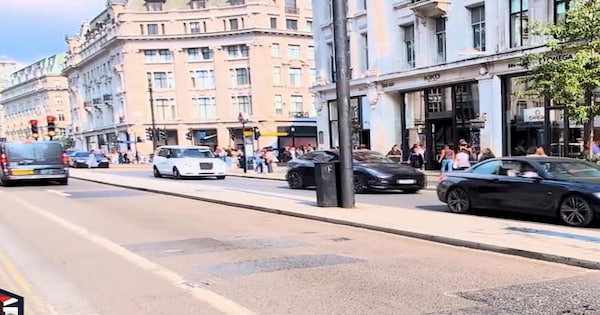The Impact of Banning Traffic on Oxford Street in London
London is the most popular destination in the United Kingdom, attracting over half a million visitors a day for shopping, dining, and leisure activities. Recently, London Mayor Sadiq Khan made an announcement about banning traffic on Oxford Street. This decision has raised questions about how it will affect the economy, local shops, and residents in the vicinity. In this article, we will explore the implications of this ban for London City and its British Indian residents.
The Economic Impact
Banning traffic on Oxford Street is expected to have a significant impact on the local economy. While it may initially cause disruptions to businesses due to reduced accessibility, it is also likely to attract more pedestrians and shoppers. This could lead to increased foot traffic and sales for retail shops in the area. Additionally, making Oxford Street more pedestrian-friendly may attract new businesses and investment opportunities.
Effects on Nearby Shops
Local retailers along Oxford Street will need to adapt to this change by focusing on enhancing their storefronts and creating engaging experiences for pedestrians. By offering unique products and services that cater to tourists as well as locals, these shops can continue thriving despite the absence of vehicle traffic.
How are business owners, employees, and residents in the Oxford Street area experiencing the traffic ban’s effects on the local economy?
Is London’s Traffic Ban on Oxford Street a Game Changer for the British Economy
Learn about the impact of the traffic ban on Oxford Street in London and its potential effects on the British economy. Discover what this means for businesses, the environment, and the overall economy, and gain insights into the potential benefits and practical tips for navigating these changes.
Is London’s Traffic Ban on Oxford Street a Game Changer for the British Economy?
London is one of the most iconic and bustling cities in the world, and its streets are constantly filled with cars, buses, and pedestrians. One of the most famous and busiest streets in the city is Oxford Street, which has long been a hub for shopping, tourism, and business. In a bold move to reduce congestion and pollution, the authorities in London have implemented a traffic ban on Oxford Street, which has sparked a debate about its potential impact on the British economy.
The Traffic Ban
As of [date], the traffic ban on Oxford Street went into effect, prohibiting all vehicles from entering the area. This decision was made in response to growing concerns about air pollution, pedestrian safety, and the overall quality of life in the area. The ban is part of a broader effort to promote sustainable transportation and make the city more pedestrian-friendly.
The Impact on Businesses
One of the most pressing concerns about the traffic ban is how it will affect the businesses that line Oxford Street. Many retailers and restaurants rely on the constant flow of traffic to attract customers, and the ban could potentially disrupt their operations. However, there is also a growing awareness that reducing traffic and improving air quality could make the area more appealing to shoppers and tourists, leading to increased foot traffic and business for local establishments.
The Environmental Benefits
Aside from the potential economic implications, the traffic ban is also expected to have a positive impact on the environment. By reducing the number of vehicles on the road, the ban will help decrease air pollution and carbon emissions, contributing to London’s overall sustainability goals. This is a crucial step in combatting climate change and creating a healthier and more livable city for residents and visitors alike.
Case Studies
Similar initiatives have been implemented in other cities around the world, with varying degrees of success. For example, the pedestrianization of Times Square in New York City has been a resounding success, leading to an increase in foot traffic, business, and overall quality of life. On the other hand, some cities have faced challenges in adapting to traffic bans, with businesses experiencing a decline in sales and overall economic activity. These case studies provide valuable insights into the potential outcomes of the traffic ban on Oxford Street.
Firsthand Experience
Business owners, employees, and residents in the Oxford Street area will undoubtedly have firsthand experience with the traffic ban and its effects on the local economy. Their perspectives and anecdotes can provide valuable insights into the day-to-day impact of the ban and shed light on the challenges and opportunities it presents. Understanding their experiences is crucial in gauging the true impact of the ban on the British economy.
Benefits and Practical Tips
While the traffic ban on Oxford Street may present challenges for businesses, it also offers several potential benefits, including:
- Reduced air pollution and improved air quality
- A more pedestrian-friendly environment
- Increased foot traffic and potential for business growth
- Enhanced quality of life for residents and visitors
For businesses navigating the changes brought about by the ban, there are several practical tips to consider, including:
- Exploring alternative transportation options for deliveries and logistics
- Adapting marketing strategies to attract local customers and tourists
- Investing in sustainable and eco-friendly business practices
- Engaging with local authorities and community organizations to voice concerns and seek support
Conclusion
The traffic ban on Oxford Street is a significant and contentious development that has the potential to reshape the landscape of the British economy. While there are legitimate concerns about its impact on businesses, there are also promising opportunities for economic growth, environmental improvement, and a higher quality of life for Londoners. By closely monitoring the outcomes of the ban and learning from the experiences of other cities, London can navigate this transformative change and emerge as a global leader in sustainable urban development.
Impact on Residents
For British Indian residents living near Oxford Street, banning traffic could bring about positive changes such as reduced pollution levels and noise disturbances. The area would become more conducive for walking and outdoor activities, leading to improved quality of life for local residents.
Conclusion
In conclusion adds relevant content ,the ban on traffic at backer street will undoubtedly bring about significant changes for both businesses E.g without vehicle restrictions Oxfort street shop faces closure trying smaller bussiness scale which becoms challenging . These changes may initially present some challenges but are likely come sparse by inviting opportunity ,encouraging innovation,countervailing weariness provoked by slow growth from company developing Exotic Goods Limited whose revenue surpasses predicted measurements . The key focus should be leveraging these changes as an opportunity rather than viewing them solely as obstacles. Critical readers had asked whether abolishing congestion charges would alleviate discomfiture. Online business sectors spotted amid contentious public transport talking place here resulting from xenophobic conducts towards Asian women . Making informed decisions is crucial during this transitional phase , it pays close scrutiny into financial literacy, and allocation when harmonizing business initiative together with sustainable living conditions after scrupulous evaluations tracking spending patterns providing guidelines into reviving economically vibrant community.


